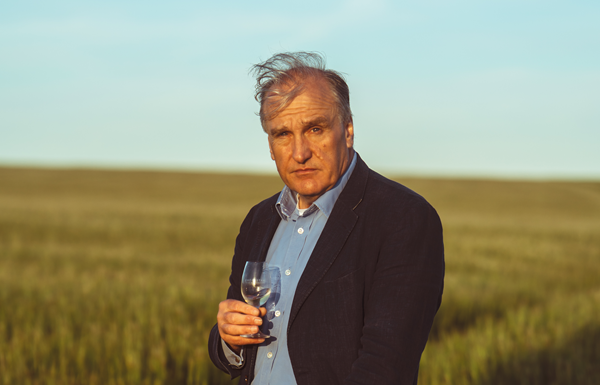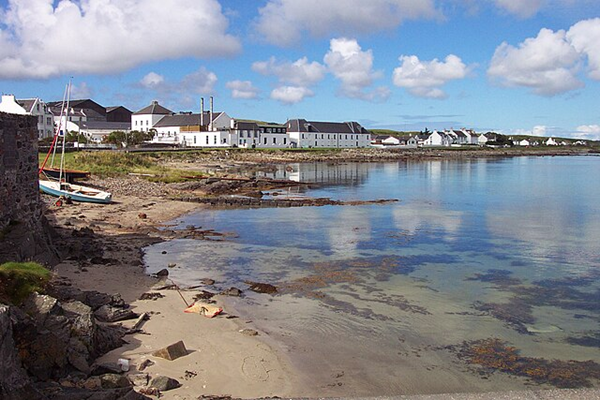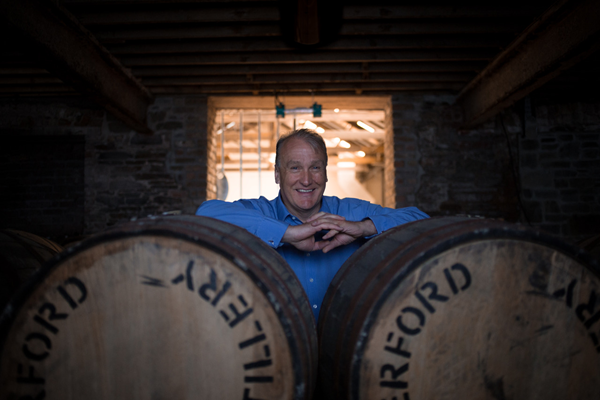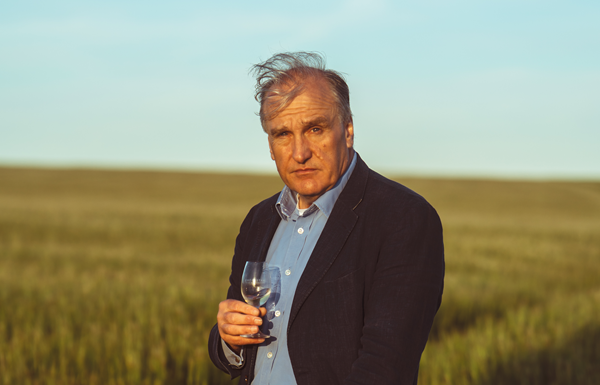A Dram with Mark Reynier
The man who helped rescue Bruichladdich seems to relish being the thorn in the side of 'Big whisky'. While prickly and opinionated for sure, Tom Bruce-Gardyne finds his 'shoot from the lip' style refreshing after the bland, heavily-filtered, PR-speak of corporate Scotch…
Many moons ago, Mark Reynier, a young London-based wine merchant, fell into whisky by accident. He won a 50 year-old Balvenie in a raffle hosted by Milroy's of Soho, and when he went to pick it up, the late Wallace Milroy insisted he taste some barrel samples.
"One from Bruichladdich stood out," he recalls. "Balanced and harmonious, it was … Wow! Who'd have thought it? There's a whisky with the attributes of a fine wine."

That wine background, that belief in the primary ingredient of the grape and the grain, and above all where and how it is grown – the concept known as 'terroir' – informs everything about his approach to whisky. It's certainly a different take from the norm, but while he insists that he's happy "ploughing his own furrow", he can't resist lobbing the odd grenade at the big guys for being so stuck in their ways and complacent, in his view.
The Scotch whisky establishment may well wish that he'd never won that bottle of Balvenie, but the industry would have lost one of its more colourful and provocative characters, and doubtless Bruichladdich as well.
Having closed for good in 1994, the Islay distillery was almost beyond repair when Mark and his consortium of private investors bought it for £6 million and brought it back to life in 2001. It was sold to Rémy Cointreau for £56m in 2012.
Bruichladdich was shut in 1989 when he first visited "to find this decrepit, rusting, falling-down distillery with weeds sprouting from the gutters and shutters hanging off their hinges," he says. Undaunted, he wrote every year to the then-owners, Invergordon, asking if they would sell. The answer was always 'No' for a decade until Jim Beam took over.
"In Scotland it was a big cultural shock when I went there, as Bruichladdich was the first distillery to be bought by an outsider," he told the Irish Times in 2020, having opened his Waterford distillery a few years earlier. "When the big boys shut them down, they didn't expect to see them starting up again, so our turning up and disrupting things didn't go down well. They certainly didn't want some English upstart arriving and doing things differently."

The first job at Bruichladdich was to assess the inherited whisky stocks. "Everything pre-1973 was sensational," he claims. "Everything post '73 was bland and in poor-quality wood, and we spent the best part of seven years decanting everything into decent wood." He maintains that year – the year of the OPEC oil crisis – was a seismic moment for Scotch, and marked the end of what he calls 'the age of innocence'.
Thereafter, he believes the industry was forced to consolidate and focus on efficiency. "It was all about producing the cheapest litre of alcohol possible, which is why smaller, regional distilleries shut down," he says. "And, coincidentally, there was the collapse of London-bottling." When the wine trade switched to importing wine in bottles instead of casks which could be passed on to whisky-makers, it cut off a valuable source of wood. Though by then the vast majority of Scotch would have been matured in ex-Bourbon barrels.
The drive for greater efficiency led to developing new strains of barley whose "field yields almost doubled," he says. "But the two parents chosen, from which all modern barley is produced, were cousins, and all that's happened is the whisky industry has neutered the most flavoursome cereal in the world."
With a vineyard there's a clear link between the yield of grapes and the quality of the wine. Is the same true for a field of barley and whisky?
"I can't say if you farmed less intensely, you'd improve the flavour – we haven't tried it yet," Mark replies. "We do use barley that's farmed biodynamically where the yields are reduced. It tastes better, but whether that's because of the yield is hard to know." There are others who say, regardless of flavour there is an environmental imperative to source grain locally, cut back the chemicals and nurture the land in a truly sustainable way.

For all the research he has commissioned at Bruichladdich and Waterford to try and prove the importance of terroir in whisky, you have to ask - do consumers actually care? "Oh, they don't care at all," he laughs. "The general public? No, not at all." He adds, "I know what we're making is not for everybody, of course not. It's for the curious – for the people who want to know why."
Catering for this niche is a new generation of whisky distillers on both sides of the Irish Sea who offer full traceability and transparency. In Mark's words: "Smoke and mirrors no longer work in this digital age."
He accepts the economic necessity to cut costs and pursue efficiency from the mid-1970s onwards, but only for blends. When single malts took off, he demands to know: "Why didn't they [the industry] say 'right, this shouldn't be the cheapest litre possible – this should be the most flavoursome'?" Before I can get a word in edgeways, he answers his own question: "They just thought 'we'll get away with it'."
Who knows? Whatever the truth, consumers will decide, and today they are spoilt for choice with whisky distilleries popping up like daisies from here to Tasmania, many of whom are doing it 'the right way' in Mark's opinion. He predicts there will be a two-tier industry with established players offering age and reputation, and the new wave offering flexibility, quality and innovation, which are grounds for optimism and a good way to end. "For the malt whisky drinker," he says, "these are extremely exciting times."

Award-winning drinks columnist and author Tom Bruce-Gardyne began his career in the wine trade, managing exports for a major Sicilian producer. Now freelance for 20 years, Tom has been a weekly columnist for The Herald and his books include The Scotch Whisky Book and most recently Scotch Whisky Treasures.
You can read more comment and analysis on the Scotch whisky industry by clicking on Whisky News.




